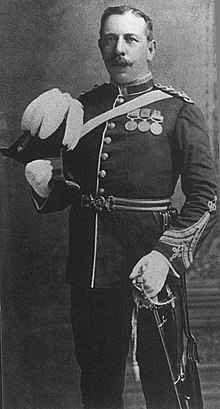Frank Bourne
| Frank Bourne | |
|---|---|

Photograph of Frank Bourne taken c.1905
|
|
| Born |
27 April 1854 Balcombe, England |
| Died | 8 May 1945 (aged 91) Beckenham, London, England |
| Buried at | Beckenham Crematorium and Cemetery |
| Allegiance |
|
| Service/branch |
|
| Years of service | 1872 - 1907, 1914 - 1918 |
| Rank | Lieutenant Colonel |
| Unit | 24th Regiment of Foot |
| Battles/wars | Great War |
| Awards |
Officer of the Order of the British Empire Distinguished Conduct Medal |
Lieutenant-Colonel Frank Edward Bourne OBE DCM (April 1854 – 8 May 1945) was a decorated British soldier who participated in the defence of Rorke's Drift during the 1879 Anglo-Zulu War. He was the last known survivor of the battle.
Born in Balcombe, Sussex, England in 1854, Bourne enlisted in the Army at Reigate on 18 December 1872, aged 18 years 8 months. Four years later he had been promoted to Colour Sergeant becoming the youngest NCO of this rank in the entire British Army. This earned him the nickname 'The Kid'.
On 22 and 23 January 1879, Bourne was part of the garrison at Rorke's Drift, Natal, South Africa, which held off a Zulu army. Bourne, who was now an NCO in B Company, 2nd Battalion, 24th (2nd Warwickshire) Regiment of Foot, helped organise the defence at the mission station and field hospital. Throughout the day and night of the battle, the Zulus made repeated attacks against the barricades, but the outnumbered defenders held out until relief arrived.
For his bravery, Bourne received the Distinguished Conduct Medal (DCM) for "outstanding coolness and courage" during the battle, with a £10 annuity. The DCM, until 1993, was the second highest military decoration (after the Victoria Cross) awarded to other ranks of the British Army. He was offered a commission, but "being an eighth son, and the family exchequer ... empty", he declined it.
...
Wikipedia
